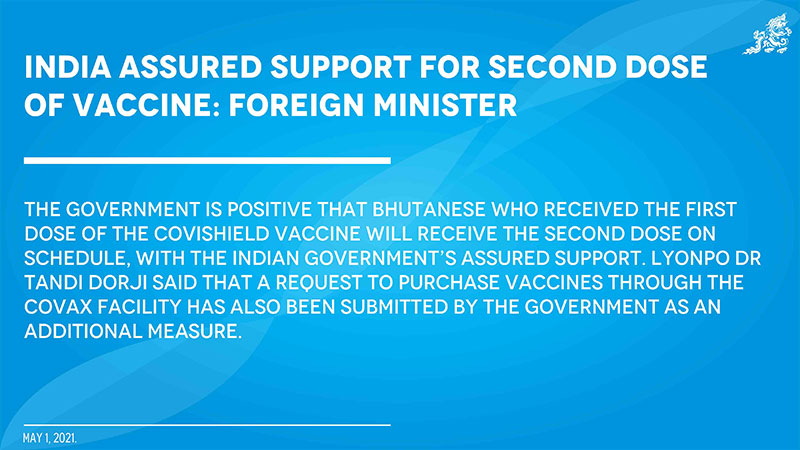Govt. exploring other options in the meantime
Younten Tshedup
The government is positive that Bhutanese who received the first dose of Covid-19 vaccine, AstraZeneca, will receive the second dose as per the schedule — eight to 12 weeks after the first dose.
With India fighting a highly contagious and lethal second wave of the pandemic and reporting a shortage of vaccine for its own citizens, many at home are concerned if Bhutan would get the second dose.
The first dose was administered in a campaign mode between March 27 and April 4. About 467,000 (more than 80 percent of the eligible adults) Bhutanese and foreigners in Bhutan were given the first shot in nine days that made headlines worldwide.
Foreign Minister Dr Tandi Dorji, said that the Indian government has assured their support to Bhutan in terms of getting the second dose of the Covishield vaccine.
Lyonpo said that the assurance also came from the Indian foreign secretary during a meeting with the Bhutanese ambassador to India, last week. “Even with the current unfortunate situation in India, we are hopeful they would support us because with the first dose, we are only half protected.”
He however, said that the question was that if India could supply the vaccines all at once. “We still have a month and half for the second dose to begin and in the meantime, we are exploring other avenues as well.”
Other options
The COVAX Facility is the most realistic option when it comes to vaccines for Bhutan. The cabinet last week approved and signed the documents that were required to access the facility.
Until the recent bilateral assistance from India, Bhutan’s only access to the Covid-19 vaccine was through the COVAX Facility. COVAX is one of three pillars of the Access to Covid-19 Tools (ACT) Accelerator, which was launched in April 2020 by the WHO, the European Commission and France in response to the pandemic.
As a member of the Facility, Bhutan would receive free vaccines for 20 percent of its population under the initiative. The Facility has allocated 108,000 doses of AstraZeneca vaccine and about 5,900 doses of the Pfizer vaccine for Bhutan.
Besides receiving the free vaccines from the Facility, Lyonpo Tandi Dorji said that the government had also submitted a request to COVAX to purchase vaccines through the Facility.
Last month, the COVAX Facility had launched its cost-sharing modality, making it possible for members to purchase Covid-19 vaccines through the Facility.
However, Lyonpo said that with the increasing global demand for vaccines, the COVAX Facility itself was not able to meet its minimum requirement to cover the 20 percent coverage, for now.
The government has also ordered some 200,000 doses of Pfizer vaccine from Pfizer Inc., the American multinational pharmaceutical corporation. Lyonpo said because Pfizer for now was the only vaccine approved for children between the age groups of 12-17 years, to ensure vaccine coverage for a larger population, the decision was made.
“Since we have a large population of young people, we need to cover these groups to achieve herd immunity, which is approximately about 70 percent of the entire population,” he said.
Lyonpo added that the government was also considering the procurement of the AstraZeneca vaccine from Korea, Thailand, and Australia, which have now started to produce the vaccine besides India’s Serum Institute. “The foreign ministry is keeping a close eye on this and have asked all our missions (offices in foreign countries) to start the channel of communication so that whenever possible, we can get some vaccines from these countries as well.”
Health Minister Dechen Wangmo said that for now the access to vaccines was a major challenge globally. Lyonpo said that during a recent tri-patriate meeting with WHO, UNICEF and the health ministry, the discussion was on the quantity of the vaccine Bhutan could procure.
Lyonpo said that although COVAX has allocated 108,000 doses of AstraZeneca vaccine for Bhutan, the ministry for now has not received any definite date of shipment. “We are pursuing COVAX’s cost-sharing option and once it is finalised, it would be submitted to the cabinet for approval.”
Prime Minister Dr Lotay Tshering said in the light of the growing global demand for vaccines, the country was exploring all possible options. “In terms of money, we don’t have any issues. But I don’t mean to say that we have enough money,” Lyonchhen said. “For all Covid related issues, we have clear instruction from His Majesty. His Majesty has said that we can spend whatever amount is needed, and that it would come from the King’s treasury.”
Lyonchhen added that although the country has made reservations for the Pfizer vaccine, the production capacity was not able to meet the demand for now. He said that by the end of the year, Pfizer would produce around 2 billion (B) doses but the demand was already over 4B.


